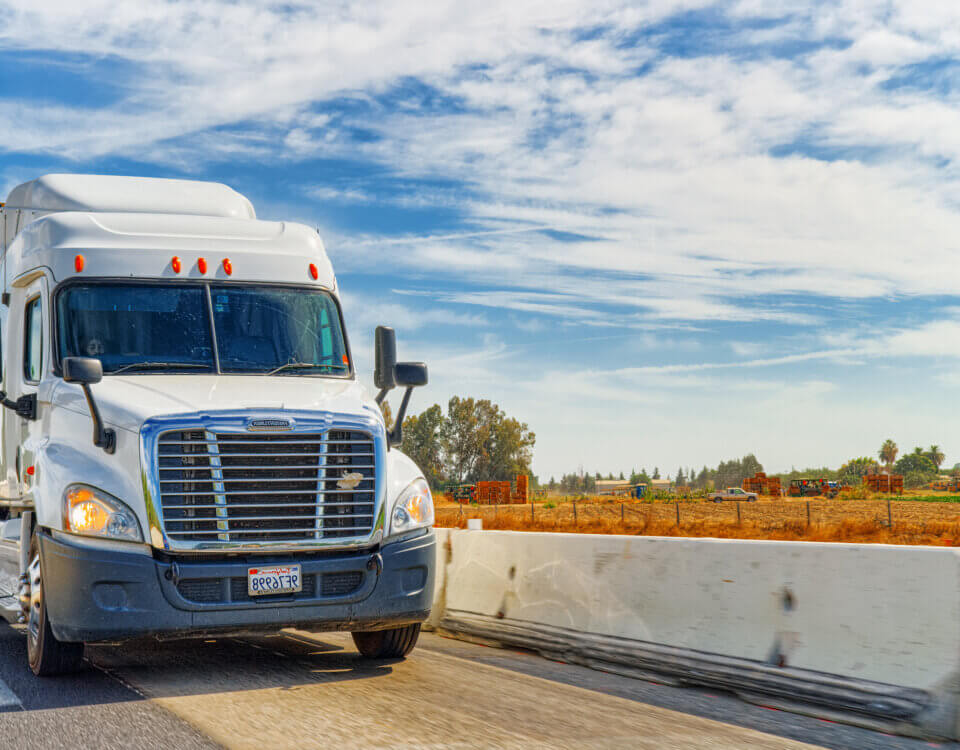Truck accidents in California are among the most catastrophic vehicle collisions on the road. With commercial trucks weighing up to 80,000 pounds, the force of impact can cause devastating injuries and property damage. If you’ve just experienced a truck accident, your actions in the next moments could determine the strength of your legal claim and your path to recovery.
Ensure Safety and Call 911
Your immediate priority after any accident is the safety of everyone involved. Assess yourself and any passengers for injuries, and if anyone is hurt, do what you can to address the injuries.
If your vehicle is not too damaged to move, try to move it out of the way to avoid it becoming a hazard. Otherwise, turn on your hazard lights and/or deploy an early warning device to make it easier for other road users to spot you.
California law (Vehicle Code §20008) requires reporting a collision involving injury or death within 24 hours. In most cases, you will want to call 911 immediately, especially if the accident involves significant damage, hazardous materials, or blocked roadways, call 911 immediately.
Even if injuries seem minor, it’s crucial to report them, as some symptoms may not appear until hours or days later. Follow the dispatcher’s instructions and cooperate fully with emergency responders.
Note that while you can and probably should help other people involved in the accident, you should, unless you have proper training, avoid moving unconscious or trapped individuals, as you run the risk of exposing yourself to danger, or of worsening their condition.
Get a Police Report
When emergency services arrive, a police officer will typically be dispatched to the scene to investigate the accident. This officer will create an official police report, which will document important details.
You will find the following information on the report:
- Time, date, and location of the crash
- Parties involved (drivers, trucking company)
- Initial fault assessment
- Any traffic citations issued
This report is a critical piece of evidence for your legal claim, as it provides an impartial account of the incident. Make sure to get the officer’s name and badge number, and ask how you can obtain a copy of the report once it’s available.
You will be given a temporary case number to track. You will need this when claiming your report from the appropriate law enforcement agency.
Document the Scene
Collecting evidence at the scene is crucial for supporting your claim. Take detailed photos and videos of everything related to the accident.
This includes:
- Vehicle Damage: Capture all angles of damage to your vehicle, the truck, and any other vehicles involved. Get close-up shots of specific damage points.
- Scene Overview: Photograph the entire accident scene, including road conditions, traffic signs, skid marks, debris, and the surrounding environment.
- Injuries: If you or any passengers have visible injuries, document them clearly.
- Witness Information: If there are witnesses, ask for their names, phone numbers, and email addresses. If they are willing, get a brief statement from them about what they saw.
- Relevant Documents: Photograph any documents exchanged at the scene, such as insurance information or driver’s licenses (if shared and appropriate).
Do not rely solely on police photographs, as they may not capture all the details you need for your claim. The more thorough your documentation, the stronger your case will be.
Collect Contact & Insurance Information
After ensuring safety and documenting the scene, the next critical step is to gather essential contact and insurance information from all parties involved. This information is vital for filing insurance claims and for any potential legal proceedings.
Make sure to collect the following details:
- Other Driver(s):
- Full name
- Phone number
- Email address
- Driver’s license number
- License plate number of their vehicle
- Trucking Company:
- Company name
- Address
- Phone number
- USDOT number (if not already photographed)
- Insurance Information:
- Insurance company name
- Policy number
- Name of the policyholder
- Witnesses: (as mentioned in the “Document the Scene” section)
- Full name
- Phone number
- Email address
Be polite and cooperative, but also be assertive in getting the necessary information. If anyone is reluctant to share details, do not escalate the situation; simply note their reluctance and rely on the police report for information.
Avoid discussing fault or making any admissions of guilt at the scene. Your priority is to collect factual information.
Seek Medical Attention
Even if you feel fine immediately after a truck accident, it’s crucial to seek medical attention as soon as possible. Adrenaline can mask pain and symptoms of serious injuries, and some conditions, like whiplash or internal bleeding, may not manifest for hours or even days.
Be thorough and honest with your doctor about all your symptoms, no matter how minor they seem. Follow all recommended treatment plans, including follow-up appointments and specialist referrals.
Skipping appointments or failing to follow medical advice could negatively impact your health and your legal case.
Common Injuries in Truck Accident Cases
Truck accidents often result in severe and debilitating injuries due to the sheer size and weight of commercial vehicles. Some common injuries include:
- Traumatic Brain Injuries (TBIs): Ranging from concussions to severe brain damage, TBIs can have long-lasting effects on cognitive function, memory, and personality.
- Spinal Cord Injuries: These can lead to partial or complete paralysis, chronic pain, and significant loss of mobility. These types of injuries can vary greatly in severity, from minor nerve damage to complete severance of the spinal cord, impacting sensation, motor function, and quality of life.
- Bone Fractures: High-impact collisions can cause multiple and complex bone breaks, often requiring extensive surgery and rehabilitation.
- Internal Injuries: Organs can be damaged or ruptured, leading to internal bleeding and life-threatening complications. These types of injuries can be particularly dangerous because they may not be immediately apparent, requiring prompt medical evaluation.
- Whiplash and Soft Tissue Injuries: While sometimes appearing minor at first, these injuries to muscles, tendons, and ligaments in the neck and back can cause chronic pain and mobility issues.
- Lacerations and Abrasions: Cuts, scrapes, and road rash can range from superficial to deep, potentially leading to infections or significant scarring. These injuries often require immediate medical attention to prevent infection and may necessitate stitches or other wound care.
- Psychological Trauma: Beyond physical injuries, victims may experience anxiety, depression, PTSD, and other emotional distress following a traumatic accident. These emotional injuries can be as debilitating as physical ones and may require extensive therapy and support.
Preserve and Secure Evidence
Truck companies often have internal crash investigators en route within hours. You need to act quickly to preserve evidence that they may try to withhold or destroy.
Upon leaving the accident scene, take steps to secure any evidence you have collected. Store your photos and videos on multiple devices or cloud storage to prevent loss. Keep a detailed record of all communications, medical appointments, and expenses related to the accident. This meticulous record-keeping will be invaluable when building your case.
Evidence to preserve includes:
- Dashcam footage
- Electronic Logging Device (ELD) data
- Truck maintenance logs
- Driver’s logbooks and inspection reports
GPS records and dispatch notes
Ask your attorney to send a spoliation letter to the trucking company demanding preservation of this data.
Report the Accident to Your Insurance But Be Careful
After a truck accident, you are required to notify your own insurance company, often within 24 to 72 hours, depending on your policy. This step preserves your eligibility for coverage and ensures your insurer isn’t blindsided by a potential claim filed by the truck driver or their company.
When making your report, stick to the bare facts:
- The time, date, and exact location of the accident
- The vehicles involved, including make, model, and license plate
- Confirmation that law enforcement responded and a report was filed
- Any medical attention received immediately following the crash
At this stage, do not offer personal opinions, guesses, or emotions. Such statements can be used against you later even innocent remarks may be interpreted as admissions of fault, or as downplaying your injuries.
Never Provide a Recorded Statement Without Legal Counsel
Insurance adjusters are trained to minimize payouts, and that includes your own insurer. They may sound friendly, but they are documenting everything you say, looking for inconsistencies, admissions, or statements that can be taken out of context.
You are not legally required to provide a recorded statement without speaking to a lawyer first. Decline politely and say you’ll get back to them once you’ve consulted legal counsel.
Do Not Discuss the Truck Driver’s Behavior or Speculate on the Cause
Let the evidence and police reports speak for themselves. If you say something like, “The truck must have been speeding,” but later it’s proven the truck was within the speed limit, your credibility is damaged.
Even truthful but speculative comments can complicate your case. Keep all discussions objective and minimal until your truck accident attorney can guide you.
Consult a California Truck Accident Attorney
Truck accident claims are not standard personal injury cases. They involve a web of potential defendants, industry-specific regulations, and corporate defense teams that mobilize immediately after a crash.
Without legal representation, you’re at a severe disadvantage especially when facing a trucking company that has its own attorneys, insurance adjusters, and investigators working to minimize its liability from day one.
Why These Cases Are More Complex Than Standard Auto Accidents
Unlike a typical car accident where one or two drivers are involved, a truck collision can implicate:
- The truck driver for negligence, fatigue, intoxication, or distracted driving
- The trucking company for hiring unqualified drivers, overworking them, or cutting corners on safety
- A maintenance or repair contractor for failing to inspect or repair brakes, tires, lights, etc.
- The cargo loading company for improperly balanced or unsecured cargo leading to rollover or jackknife accidents
- The vehicle or parts manufacturer for defective brakes, steering systems, or tires
Each of these parties may be partially responsible, and each will point fingers elsewhere. Identifying and proving liability requires detailed investigation, technical knowledge, and aggressive legal strategy.
What a Skilled California Truck Accident Attorney Will Do
A qualified attorney will immediately step in to shift the balance of power. Their responsibilities go far beyond filing paperwork:
Investigate and Identify All Liable Parties
- Review police reports, driver logs, GPS data, black box information, and employment records
- Analyze maintenance records and cargo manifests
- Identify violations of federal or state regulations
- Hold all responsible parties accountable not just the driver
Preserve Crucial Electronic and Physical Evidence
- Send a spoliation letter to prevent destruction of logbooks, ELD data, onboard cameras, and dispatch records
- Secure truck inspection reports, maintenance logs, and pre-trip safety checklists
- Collect dashcam footage, eyewitness statements, and road surveillance video
Without prompt legal intervention, trucking companies often destroy or “misplace” this data within days.
Coordinate Medical Experts and Accident Reconstructionists
- Ensure you’re evaluated by doctors who understand the long-term impact of spinal trauma, brain injuries, or chronic pain
- Hire independent accident reconstruction professionals to rebuild the crash from physical and digital evidence
- Quantify damages such as loss of earning capacity, future care needs, and emotional trauma
Maximize Your Compensation
- Negotiate directly with insurers on your behalf
- Avoid lowball settlements that don’t account for long-term consequences
- Take the case to trial if insurers refuse to offer a fair amount
- Demand punitive damages if the trucking company acted with gross negligence or recklessness
When You Need Legal Support After a Truck Accident, Call Hillstone Law
Don’t navigate the complex aftermath of a truck accident alone. The stakes are too high, and the opposition is too formidable.
The sooner you involve an experienced truck accident attorney, the better equipped you’ll be to protect your rights, preserve critical evidence, and secure the full compensation you deserve for your injuries and losses.
If you or a loved one has been involved in a truck accident, act now. Contact Hillstone Law Accident & Injury Attorneys today at (855) 691-1691 for a free consultation.
Let our dedicated team handle the legal complexities while you focus on your recovery. Your future depends on the actions you take today.
Note: These blog posts are created solely for the use of Hillstone Law. The information is gathered from internet research, publicly available sources, and artificial intelligence (AI) tools such as ChatGPT. While we aim to share helpful and educational content, Hillstone Law does not independently verify every detail. Some information may be incomplete, outdated, or subject to change without notice. If you believe any part of a post is inaccurate, misleading, or infringes upon copyright, please contact Hillstone Law immediately so we can review it and take appropriate action, including correction or removal.
Disclaimer: The material provided in these blogs is for general informational purposes only and should not be considered legal advice. Reading these posts does not create, and is not intended to create, an attorney-client relationship with Hillstone Law. Our intent is to share knowledge, raise awareness, and provide helpful resources to the public; however, Hillstone Law makes no warranties or guarantees about the accuracy, completeness, or reliability of the information provided, and expressly disclaims liability for any actions taken in reliance on it. The photos used in these posts are for illustrative purposes only and do not depict actual clients, individuals, or incidents unless expressly stated. If you or a loved one has been injured in an accident, please contact Hillstone Law at (855) 691-1691. Our attorneys are available to answer your legal questions and help you understand your rights.







